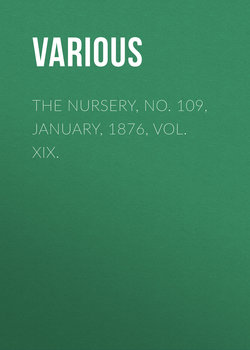Читать книгу The Nursery, No. 109, January, 1876, Vol. XIX. - Various - Страница 3
THE PARROT FEEDING ITS YOUNG
ОглавлениеThe parrot is a curious bird. Here is a picture of one feeding its young. It has a large hooked beak, and climbs trees by the aid of its beak and feet.
The plumage of parrots varies in color. I have seen it of a bright green, also, red and gray. These birds were well known to the ancient Greeks and Romans, who got them mostly from India and Africa.
The parrot, as every child knows, can be taught to talk. This power it shares with some other birds whose tongues are thick, round, and almost the same in form as that of the parrot. Starlings, blackbirds, jays, jackdaws, and ravens can imitate the human voice.
The parrot imitates all the noises it hears—the mewing of cats, the barking of dogs, and the cries of birds—as easily as it imitates speech. The parrots brought from Africa seem to prefer imitating the voices of children, and, on that account, more easily receive their education from them.
But the gray parrot imitates the grave tones of older persons. A parrot from Guinea, taught on the voyage by an old sailor, had caught up his hoarse voice and cough perfectly. Afterwards, owned and taught by a young girl, it did not forget the lessons of its first master. It was amusing to hear this bird pass from a soft, girlish voice to his hoarse and sailor-like tone.
Not only has the parrot the power of imitating the human voice, but it seems to wish to do so. This is shown by its attention in listening, and by the efforts it makes to repeat every word. It will often repeat words or sounds that no one has taken the trouble to teach it.
A parrot which had grown old with its master, and shared with him the pains of old age, being used to hear but little more than the words, "I am very ill," when asked, "What is the matter, Polly?" answered in a dismal tone, and stretching itself, "I am very ill."
The language of the parrot is not wanting in ideas. When you ask one if it has breakfasted, it knows well how to answer you, if it has satisfied its hunger. It will not tell you that it has breakfasted when this is not the case: at least, you cannot force it to say "No" when it ought to say "Yes."
I have heard of a parrot, which, when pleased, would laugh most heartily, and then cry out, "Don't make me laugh so! I shall die, I shall die." The bird would also mimic sobbing, and exclaim, "So bad, so bad! got such a cold!" If any one happened to cough, the parrot would remark, "What a bad cold!"
Uncle Charles.
The Sea-Swallow.
